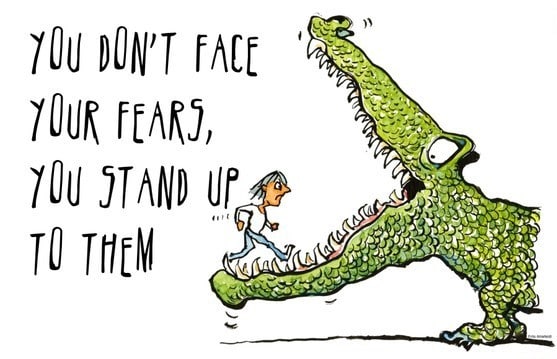Dental anxiety: Gosh who wants to talk about that? I know what you’re thinking. Dentists, what a horrible thing.
Trust me I don’t fault you. If you’ve ever had a bad experience at the dentist, I apologize. That’s how all fears usually start. A strong association with something negative begins to cement into our minds.
Here’s the reality: Being afraid of the dentist is common. Yes, common. Studies estimate that as many as 60% of dental patients have anywhere from mild to severe dental fear. If you fear the dentist, trust me, you are not alone. As a sedation dentist, I treat patients every day that are afraid of anything that has to do with a dentist.
When dentistry is your biggest fear, just know it is possible for you to not only feel at ease with general dentistry services, but very complex reconstructive dentistry as well. It takes time. It takes understanding. Just as dental phobia starts from a negative experience, overcoming dental phobia starts by positive experience with your dentist. So, YES… I know its hard to believe, but it is possible you can eventually be fearless at the dentist. Let’s explore this more.
The Power Is Within You
Everyone has something they fear. Absolutely everyone. Think of anything else in your life that was a major challenge that you eventually overcame. How did you overcome it? Most likely, the process began by simply deciding your life would be better by addressing it. Then you started to do only two things—1) Take one step at a time 2) Commit to stepping forward. You probably didn’t need to overcome it with superhuman heroics. The key to anything in life is simply to begin trying.
Have you ever seen an elephant at an old fashion circus? They were secured by a small stake in the ground and a flimsy rope. There’s no way that system could contain a massive elephant, right? You look at the elephant, and you know that the elephant could tear down the entire tent with little effort. Yet, the elephant doesn’t even try. Why? Because the elephant’s conditioned. It’s true for elephants, just as it is for humans. Some attributes can become ingrained. It can make us believe we are powerless—even if it couldn’t be further from the truth.
Allow me to explain. In the old fashioned circus, the elephants were trained when they were little. The trainers put a rope around the elephant and a stake in the ground. The baby elephant fights and wrestles to break free of the rope, but they are not strong enough yet. What happens is, after a while…they simply stop trying. The elephant decides, ‘I’m not capable of pulling this out.’ According to motivational speaker Tony Robbins, “Once that becomes the identity of anyone” – an elephant, in this case – “they don’t even try, anymore. It’s just who I am, that’s how it is. That’s just the way it is in my life.” The point is we all accept fears and limitations as part of who we are. It’s when we try to test the system that we find we had the power within all along to succeed.
In times of fear, our emotions can strip away all our strength and make us feel like children. As adults we over complicate things. We make excuses. We search for elaborate solutions. Don’t give up on yourself. Sometimes all we need to do is—1) Move forward one step at a time 2) Consistently trust in moving forward

The Different Emotions of Dental Anxiety
Back to dental anxiety specifically. It is completely normal to have some anxiety about going to the dentist. Any process with the possibility of discomfort or the possibility the unknown, creates anxiety in all of us. It’s just the way it is.
Anxiety becomes more of a phobia when people build up the fear to the point where the fear creates anticipations that are more negatively distorted than the actual reality. Dental anxiety causes people to avoid following through with an appointment because they think to themselves, what if their fears were to be true? This puts their oral health at jeopardy which further embeds their fears. This is when dental anxiety turns into a phobia.
So techniquely what is Dental phobia? Dental phobia is an intense fear of anything that has to do with the dentist. Other technical names for dental phobia are odontophobia and dentophobia. Anxiety can arise whenever a person just thinks about a dental office, the patient room, dentist, and dental procedures. People who suffer from dental anxiety often have a difficult time sleeping the night before a dental appointment.
Some people will have trouble sleeping nights before if the appointment is that far away. Crying and feeling physically ill are common for people who have a phobia of the dentist. Fainting, vomiting, and breathlessness can also occur. Some of these feelings are triggered by very specific parts of a dental appointment such as from needles or the sound of the handpiece. Sometimes its just the whole idea of the dentist that creates anxiety. This is normal. You’re mind is subconsciously vowing to protect you whether its needed or not.
Patients often schedule an appointment and then in a panic cancel on short notice. It’s important to know that these feelings are okay to discuss openly with your dentist. He or she can help customize the experience to best relieve your anxiety. If he or she understands how you are feeling, they can help talk things through. Overtime these symptoms can and will improve.

How a Dentist Experienced with Dental Anxiety Can Help
A sedation dentist often called sleep dentist, is a type of dentist with specialty training to help people who suffer from a fear of the dentist or anything that relates to it. Many people believe it’s just putting them to sleep during procedure. Fortunately, it’s more than just being sedated. Sedation dental practices that cater to severely anxious patients like my practice, Aesthetic Smile Reconstruction, use several different strategies to calm the uneasiness patients experience which is customized based on the level and type of fear the patient has. Let’s talk about some of the techniques we can use.
1) Communication
Talking about your fear is one of the best ways to overcome it. Before any dental treatment, a sedation dentist will get to know you. You may not know exactly why you feel anxious, and that’s totally okay!
Just acknowledge your fear as best you can. Venting can help you get through some of the feelings you’re having. It’s also important for the dentist to understand any triggers or past experiences to minimize your anxiety. This will allow the sedation dentist to talk about what the appointment will be like for you. This includes what the dentist will do, what the hygienists will do, and what you can expect during and after treatment. And don’t just take my word for it, studies are showing that talking about stress is one of the most effective therapies.
Some patients even ask for me not to discuss too many technical details, and that is okay too. The goal is that you should feel as though there are no surprises. Many people are anxious because they simply don’t know what to expect.
2) Calming Techniques
One of the ways you will overcome fear is by building positive experiences. Some practices have all the tricks to keep you comfortable. Go out and find the best near you.
At my practice, we book extra time for appointments. Rushing anything in life creates anxiety. Give anything enough time, and it will lead to success. So we always give the patients plenty of time. This allows for a settling in phase at the start of procedures if needed, and a debriefing phase at the end of procedures.
Extra time also gives time for techniques to help calm their mind and body. These calming techniques are breathing, visualization exercises, and opportunity to ask questions. During procedures offering the patient a moment to simply inhale completely through the nose, and then exhale completely out the mouth is a simple technique that gives the patient an opportunity to reset their anxiety.
Distractions are highly effective as well. In our dental practice, we have what we call cinema style dental suites—large 55” TVs in each of the patient room, noise-canceling headphones, and all equipment is tucked away in cabinetry that looks more like a living room than a dental operatory. Patients are able to see the TVs sitting up or when reclined. We offer patients weighted blankets, sunglasses, and refreshments. These little details create a feeling of safety. The details build trust and rapport.
Patients who are able to watch their favorite shows during their appointment are much more at ease because they are not focused on everything that is happening during procedures. Patients are also welcome to bring in their own electronic devices to listen to music if they would like to. If there is an item that makes you feel comfortable, request to bring it in during your appointment. Whatever it is that will make a patient feel more comfortable is generally okay as a means for us to help the patient overcome their dental anxiety. That’s what you want to look for in your dentist if you are severely anxious.
3) Taking Breaks
A patient feeling in full control is an enormous anxiety reducer. One way we give patients full control is giving the patient full authority to request breaks at any moment during a procedure—we stop immediately, no questions asked. This strengthens the trust between the patient and the doctor, and reinforces to the patient that any situation creating pain or anxiety can be stopped immediately. All patients have to do is raise their left hand. That’s the signal to the dentist to stop. When the patient feels as though there has been sufficient time to recuperate from the built-up anxiety, the procedure continues. Breaks can be taken as many times for as long as patients need. Taking it slow is one of the best ways to provide patients with an anxiety-free dental experience.

Sedation Dentistry is Your Bridge Over Troubled Waters
In addition to the above techniques, sedation dentistry can really give you an edge to overcome even the worst of fears. There are several different types of sedation dentistry available capable of reducing mild anxiety to deep sedation where even the most severe fears can melt away. Find a sedation dentist in your area who offers the full fleet of sedation services so you have all options available to you. Your fears may necessitate full sedation initially, but as you gain trust you can ween into more lighter sedation options for future visits. I know it may be impossible to imagine now, but there may be a day where you may not have dental fear even without sedation dentistry! Let’s discuss some of the most common forms of sedation options.
1) Oral Sedation
Oral sedation involves administrating a medication or combination of medications prior to an appointment that calms a person. The patient simple takes an oral pill or a combination of oral medications at the start of the visit. The medications can induce a feeling of relation and even light sleep. Often oral sedation will create an amnesia effect for the time during the procedure. The most common drugs for oral sedation include:
- Diazepam
- Triazolam
- Zaleplon
- Lorazepam
- Hydroxyzine
People who receive oral sedatives may fall asleep during a procedure but are in a state where they are able to be awoken by simply tapping their shoulder. The sedation dentist and team, closely monitor the patients vital signs to ensure safety as well as comfort at all time. Oral sedation is beneficial as it allows a combination of relaxation and control for the patient. With the administration of the drugs, their body is much calmer, which can help keep their thoughts from taking them down paths that could make them overly anxious.
3) IV Conscious Sedation
IV Sedation for dentistry or “twilight sleep” helps patients be fully comfortable and calm when undergoing dental procedures. This method of sedation is extremely safe and very precise to titrate a patient’s comfort due to the ability to adjust dosing in precise increments with real time monitoring of all vital signs. IV sedation can calm even the most extreme of dental anxiety—and trust me, you’re not the most severe we’ve successfully treated.
Think of IV sedation dentistry nearly identical to the sedation medications used during a routine colonoscopy. The type of medications and dosing used is often very similar. The procedure has a great ability of control for the level of sedation from light to more deeper levels of sedation. IV sedation dentistry allows the dental patient to be fully comfortable during any procedure. IV sedation dentistry may induce light sleep. You may not always be asleep but you will be comfortable, calm and relaxed, drifting in and out of sleep – a “twilight sleep”.
I know what you’re thinking, What if I wake up during a procedure? Do not worry, you will not have any fear or pain. You will gently drift back to sleep.
IV sedation dentistry is also very safe with an experienced sedation dentist. The patient is always safely maintained at a level where they are breathing on their own and are always able to be awoken easily. Sedation dentistry can be used in any dental procedures from general dentistry to root canals to surgery. The process is quite similar for all types of procedures.
The Risks of Not Overcoming Dental Anxiety
The problem with dental anxiety is that it makes patients put off or completely avoid routine oral care for years or decades. This can not only cause serious oral health issues, but also physical, medical and emotional health effects too.
I apologize I’m going to get a little technical to explain why you must decide to change your dental anxiety now. Let’s talk about the emotional impacts first. When we avoid taking care of anything related to our health, over time it begins to affect our happiness and self-image. Studies show attitude follows our behavior. It’s never the other way around.
For example, if you believe you are a confident and healthy person, but behave in a way that is unhealthy and self depreciating…eventually your attitude will follow. Negative behavior breeds negative attitude. Our behavior is much more powerful in determining our self-image compared to the attitude of how we hope to be. That’s how dental phobia can affect patients. Overtime lack of dental care is a behavior that pushes patients into believing their happiness and smile aren’t valuable. This couldn’t be further from the truth. There’s beauty in every smile. The way to regain confidence is by changing behavior. The easiest way to change behavior is one step at a time.
So how does dental phobia affect our health? What typically happens is the patient avoids the dentist out of fear, and time begins to pass. Health concerns which could have been treated preventatively or early stage, begin to worsen. The hard fact is that it begins to open up the possibility of more concerning dental-systemic such as
- Infections—Allowing dental decay to progress leads to unnecessary dental infections that could be treated easier.
- Alzehimers— New studies show a link between untreated periodontal disease and Alzehiemers
- Cardiovascular disease – Chronic Periodontal inflammation can lead to increased risk of a heart attack or stroke.
- Premature birth or low birth weight – This can happen when women with significant dental inflammation or missing teeth become pregnant.
- Parkinson’s Disease – When this research came out it blew my mind. A new study in 2017 showed a link between periodontal disease and the risk for developing Parkinson’s disease. This has become a hot research topic to possibly prevent future cases of the disease.
Can you believe that? Those are some pretty serious health drawbacks that are linked to oral health. When we become anxious about anything avoidance is one of the most common defense mechanisms we have. Although avoiding something helps us to feel more comfortable, it ultimately deepens the fear.
The key is taking the smallest action possible to begin the process of overcoming your dental anxiety. Find a dentist in your area who understands the psychology of dental anxiety, is nurturing, and is clinically competent. Take the first step of just meeting them for a consult. You will start the process of building trust.
Think of the first visit with a dental anxiety specialist simply as a meet and greet to get to understand what you will need, and how to get there as easily as possible.
Putting It All Together
Everyone has fear of something. It’s been said “Fear” stands for “False Emotions Appearing Real.” I agree but with one disclaimer– The false emotions are often entrenched by very specific negative experiences in our past. That can be very powerful.
These negative experiences are often so powerful that they haunt us into thinking all related experiences need to be avoided, even if they are completely out of context. False emotions appear real until we build enough positive experiences to reset the mindset. So why wait to reset a fearful mindset?
Dental anxiety or phobia is real. There isn’t anything wrong with how you feel when you go to the dentist. Many people feel the way you do. What’s important is that you find the right sedation dentist that can make you feel better about dental experiences.
Avoiding dental care and procedures can be detrimental to your health. Please, for your own sake, don’t avoid. You, your oral health, and your overall well being are too important and valuable to ignore.
You CAN get the oral care you need to stay health and have a beautiful smile. You simply need a dentist that truly cares about helping you feel better about dental procedures.
Now for the secret to dental anxiety that I promised at the start.
The Secret to Overcome Dental Anxiety

There is definitely hope. Here’s the secret: You are capable of more than you could ever imagine, and you deserve more than you know. But…and this is the key…you have to commit to taking action—regardless how small a step that is.
Once you realize you can slowly begin removing your barriers, the sky is the limit in your dental future. Find a kindhearted sedation dentist in your area, and simply begin to establish rapport with him or her. Just like dating, you will know when you’ve found– the one.
As always, feel free to contact our office and we are happy to give any advice and information we can. If this article inspired you to overcome dental phobia, please share your story. On behalf of myself and team, we are proud of you for starting this journey! Keep in touch— contact@aestheticsmilereconstruction.com.


